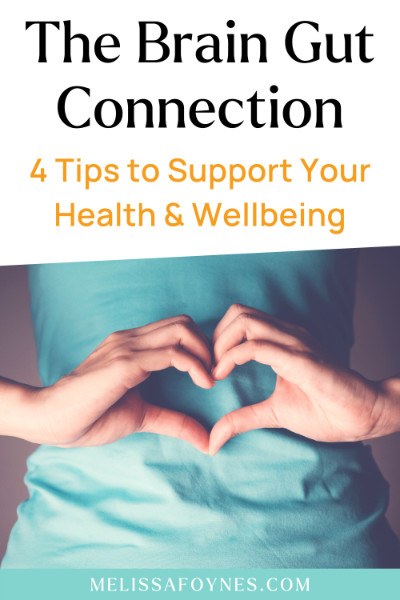welcome, I'm Melissa
Links
As a holistic coach, psychologist, mindfulness, meditation & yoga instructor, & Ayurvedic doula I offer personalized paths to growth & healing.
you may also like...
4 Tips for Supporting the Brain Gut Connection
April 29, 2021
We’re often taught to think of the digestive system as a machine that processes food. But it’s actually far more complicated.
Understanding our brain-gut connection is the key to optimal health and wellness, both physically and mentally.
Before we dig deeper into the brain-gut connection, let’s take a look at some interesting facts about the gut.
Fascinating Facts About the Gut

- The gut is made up of as many nerve cells as your spinal cord
- There are more immune cells residing in the gut lining than in the blood or bone marrow
- 95% of the body’s serotonin is stored in the gut; serotonin is essential for digestive functions as well as regulating sleep, appetite, pain sensitivity, mood and overall well-being
What is the Brain Gut Connection?
Aside from the brain, the gut is the only organ that has its own nervous system, which is known as the enteric nervous system or ENS.
Recent research on the gut microbiome has highlighted how the gut-microbiome-brain axis affects different aspects of our health and well-being.
This has a profound impact on a variety of physical and mental health conditions.
Dysbiosis: A severe disturbance in the bacterial ecosystem and an imbalance of gut bacteria is linked to:
- Diabetes
- Obesity
- Autism
- Inflammatory bowel disease
- Irritable bowel syndrome
- Cancer
- Asthma
- Psoriasis
- Parkinson’s
- Alzheimer’s
- Heart failure
- Celiac disease
- Chronic fatigue syndrome
- Schizophrenia
- Depression
- Anxiety
Some research shows that certain bacteria affect our responses to immunotherapy treatment for cancer and our immune system’s ability to fight cancer.
So, how do we best care for the gut-microbiome-axis, promoting longevity and holistic wellness and healing?
Here are 4 Tips for Supporting Your Brain Gut Connection

1. Be Mindful of What You Put in Your Body
Your diet plays a major role in supporting a healthy gut.
Here are things to avoid in your diet, for a healthy gut:
- Reducing your consumption of animal protein, which is hard on the microbiome and can cause inflammation
- Eat less processed food
- Limit artificial sweeteners; they can change the microbiome, resulting in glucose intolerance.
Plus, ways to build a healthy gut:
1. Eat more dietary fiber from whole foods.
This can help reduce inflammation, regulate blood sugar and cholesterol, and improve immunity.
2. Introduce probiotics into your diet.
Probiotics are living strains of bacteria that add to the population of good bacteria in your digestive system.
Their consumption dates back to ancient societies, such as Greece, Rome, China and India.
Fermented foods like sauerkraut, kimchi, pao cai, cheese, yogurt, sourdough bread and kombucha are popular ways to add probiotics to your diet.
You can also take probiotics, however food sources offer a more diverse source.
3. In addition to probiotics, be sure to incorporate prebiotics.
Prebiotics act as food for the good bacteria.
Prebiotic foods include kiwi, mango, peaches, apricots, cherries, broccoli, cauliflower, bok choy, cabbage, kale, rutabaga, turnips, arugula, pumpernickel bread, cacao, chickpeas, lentils, black beans, navy beans, walnuts, and mushrooms like shiitake, lion’s mane and white button.
Drinking oolong, black and green teas, as well as cranberry and Concord grape juice will also add prebiotics to your diet.
2. Eat What You Enjoy, Making It SEA (Sustainable, Enjoyable and Adaptable)

Be mindful of what you eat while also acknowledging the parameters of your life.
Make small changes at a time.
Leave behind the mindset of healthy vs. unhealthy, which just adds judgment.
Think about being in a partnership with your gut bacteria. If you feed them well, they’ll give you health benefits in return.
Tip: Roast a big batch of vegetables on Sunday for a “snack of the week.”
And remember to forgive yourself, recover and make different choices when necessary.
3. Manage Your Stress and Tend to Your Emotions
What happens in your gut is inextricably tied to what happens in your brain — and vice versa.
Rich sensory information generated in the gut, such as “butterflies” or your “stomach in knots,” is sent to the brain.
Likewise, the brain’s limbic system generates nerve signals that express emotions in the digestive tract in much the same way that signals are sent to the facial muscles, resulting in expressions.
Examples:
- When we experience anger, the stomach contracts to produce acid and slow emptying, and the intestines generate digestive juices.
- With fear, the gastrointestinal contractions of the stomach decrease, but they increase in the intestines.
- With sadness, a decrease in contractions of both the stomach and the intestines occurs.
Try to postpone eating when you’re managing something emotional, and seek ways to manage stress for the sake of your emotional well-being and physical health.
4. Promote Healthy Digestion
It doesn’t matter what you eat if you can’t digest it well.
The wisdom of Ayurveda, the traditional healing system of India, offers guidance on promoting healthy digestion.
In Ayurveda, Agni (or the digestive fire) is key.
One way to support Agni is to consume an Agni “kindler” 10 minutes before a meal. These include foods like:
- Garlic
- Ginger
- Cumin
- Cinnamon
- Coriander
- Cardamom
- Clove
- Black pepper
- Fennel
Other Ayurvedic tips include:
- Eating food at room temperature or warmer
- Taking small sips of warm water during meals (if needed)
- Chewing your food mindfully and slowly
- Taking your largest meal between 10 a.m. and 2 p.m. during the body’s peak Agni
As much as possible, eat locally grown, fresh, seasonal foods that are nutrient-dense, and avoid overeating.
Allow space between your meals for other activities like sleep, exercise and meditation.
The Brain Gut Connection: Summary
Research on the gut-microbiome-brain axis shows how gut health and our microbiome profoundly impact the body’s natural defense system and our emotional well-being.
To further explore strategies for taking care of your gut-microbiome-axis and promote holistic wellness, including a brief mindfulness practice to enhance your ability to digest and process what you are eating, listen to the full podcast episode:
MAKE SURE TO SUBSCRIBE TO THE SCIENCE & SOUL OF LIVING WELL PODCAST.
Apple | Google | Spotify | iHeart | Audible
You can also contact me or join us on Instagram – @drfoynes.
Related Nutrition & Wellness Resources:
Freebie Alert!
Freebie Alert!
Newsletter
Sign up to get a dose of love, inspiration, wisdom &
all the latest news on events straight to your inbox.
privacy
terms
made with ❤ by habitat society
Explore
©2022, Melissa foynes
Thank you
You're subscribed to my newsletter. Please whitelist my email to make sure you don't missing anything I send you.
